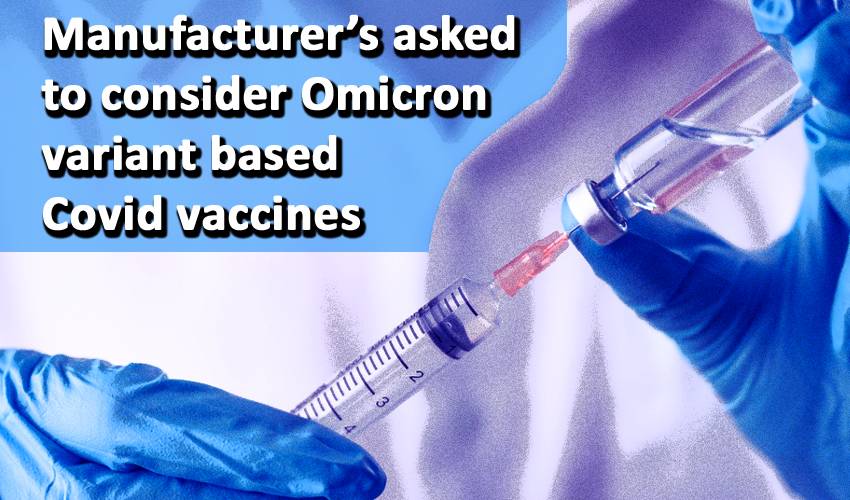
GENEVA: WHO's Technical Advisory Group on COVID-19 Vaccine Composition (TAG-CO-VAC) has advised Covid vaccine manufacturers to consider updating the vaccine antigen composition by incorporating Omicron variant given the apprehension that existing vaccines may lose their efficacy because of mutation of the virus.
In June 2022, the TAG-CO-VAC issued an interim statement highlighting that vaccines based on the index virus continued to provide robust protection against severe disease caused by all Variants of Concern (VOCs) of SARS-CoV-2. However, due to the antigenic distance and uncertainties surrounding further viral evolution, the TAG-CO-VAC acknowledged that the effectiveness of these vaccines could diminish over time. As a result, the TAG-CO-VAC recommended that vaccine manufacturers and regulatory authorities consider updating the vaccine antigen composition using Omicron, the most antigenically distinct SARS-CoV-2 variant discovered to date, for use as a booster dose.
In March 2023, the TAG-CO-VAC met in Muscat, Oman to review the performance of updated COVID-19 vaccines incorporating descendent lineages of Omicron as a booster dose, and establish timelines for vaccine composition recommendations in 2023.
The TAG-CO-VAC assessed the performance of updated COVID-19 vaccines incorporating descendent lineages of Omicron based on several types of evidence. This evidence included published observational epidemiological studies estimating the absolute and relative vaccine effectiveness of bivalent mRNA vaccines containing BA.1 or BA.4/5 as a booster dose against symptomatic and severe disease. The TAG-CO-VAC also reviewed laboratory-based data on the magnitude and breadth of cross-reactive immune responses induced by BA.1- or BA.4/5-containing mRNA vaccines compared to index virus-based vaccines used as a booster dose against previous and circulating SARS-CoV-2 variants. In addition, the TAG-CO-VAC examined laboratory-based studies and observational data on immune memory responses to evaluate the impact of repeated antigen exposure on vaccine-induced immunity and protection.
After reviewing the data, the TAG-CO-VAC concluded that index virus-based vaccine booster doses remain highly effective in protecting against severe disease and death caused by all SARS-CoV-2 variants, including contemporary Omicron descendent lineages. However, the protection provided by both index virus-based and BA.1- or BA.4/5-containing bivalent mRNA vaccines against severe disease and symptomatic infection declines over time, with protection from severe disease lasting longer.
Compared to index virus-based vaccines, booster doses of BA.1- or BA.4/5-containing bivalent mRNA vaccines may slightly increase vaccine effectiveness against symptomatic disease. Both BA.1- and BA.4/5-containing bivalent mRNA vaccines provide a greater magnitude and broader range of cross-reactive immune responses against SARS-CoV-2 variants as a booster dose compared to index virus-based vaccines. BA.4/5-containing bivalent mRNA vaccines induce higher neutralizing antibody titres against recent Omicron descendent lineages such as BQ.1 and XBB.1 compared to BA.1 containing bivalent mRNA vaccines when used as a booster dose.
In vitro evidence suggests that immune imprinting, also known as original antigenic sin, can occur with repeated exposure to the same antigen. This phenomenon biases the immune response towards previously encountered antigens. However, limited data and the possibility of bias make the clinical impact of immune imprinting unclear.
The TAG-CO-VAC is responsible for making recommendations on updates to vaccine composition to ensure continued protection against SARS-CoV-2 variants, while vaccination policies are recommended by the Strategic Advisory Group of Experts on Immunization (SAGE).
The TAG-CO-VAC reiterates the importance of achieving broader cross-reactive vaccine-induced immune responses in the context of continued SARS-CoV-2 evolution. In future meetings, the TAG-CO-VAC will consider vaccine antigen composition and assess whether the inclusion of the index virus is necessary in future vaccine formulations. Furthermore, the TAG-CO-VAC encourages the development of vaccines that enhance mucosal immunity as they may provide improved protection against infection and transmission.
The TAG-CO-VAC will meet twice in 2023 (in May and approximately 6 months later) to assess the genetic and antigenic evolution of SARS-CoV-2 variants, vaccine performance, and implications for COVID-19 vaccine composition. Based on these assessments, the TAG-CO-VAC will issue recommendations to maintain the current vaccine composition or consider updates.

